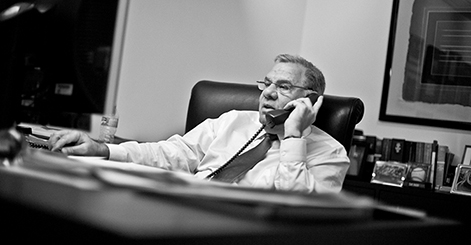Lawyer Limelight: Ira Leesfield
By Melissa Chan | October 17, 2014 | Lawyer Limelights

Photo provided by the firm.
Ira Leesfield is one of Florida's most sought-after personal injury attorneys. Since the 1970s, Leesfield has been recognized for his commitment to helping clients who are going through tragedy and loss. His firm, Leesfield Scolaro, has one of the region's most impressive records of multimiliion-dollar verdicts and settlements for plaintiffs. The 1971 graduate of the University of Florida Law School is a past president of the Florida Justice Association and served the Clinton Administration in two different positions. As a firm believer in making a difference, Leesfield also has shared his time and resources towards charities, humanitarian causes and scholarships.
Lawdragon: You recently received the Citation of Honor Award by the Fatherhood Task Force. Can you tell us what this means to you?
Ira Leesfield: When the Fatherhood Task Force of South Florida presented me with the Citation of Honor award, my first thought was “how rewarding it is to be able to tell my story in a meaningful way and provide support to this very important cause.” The room was filled with enthusiasm, warmth and aspiration. What more can you ask for?
LD: You served for President Clinton in two positions from 1992 to 2000, on the President’s Council on Physical Fitness and Sports and the Presidential Advisory Commission on Holocaust Assets. What was it like to work with the Clinton administration?
IL: My work with the Clinton Administration and continued involvement with Clinton activities and endeavors is an amazing chapter of my life. Each time President Clinton selected me for White House service, I thought I might have to pinch myself to see if it was real. His style of management is to give you as much responsibility as you can handle. That works just perfectly for me. The Holocaust work took us around the country and the world, and brought both personal gratification and an important historic change in recognizing Holocaust assets.
LD: Are there any cases that particularly standout? Or any clients you were able to help that you are most proud of?
IL: Over the past 37 years, so many results for our clients have impacted my dedication to our underprivileged clients, injured clients or those clients who are dealing with tragedy and loss.
I will never forget a young single mom with a three-year-old daughter was devastated in a motor vehicle accident, and we were able to provide them with a lifetime of financial security. We won a $19.8 million verdict for a Pennsylvania quadriplegic injured by a negligent manufacturer—the moment the verdict was returned will be forever embedded in my mind. In Key West, a family lost their young child on a boating accident, and this case gave me the opportunity to not only to be a lawyer, but also a counselor and a friend. My work with sexually-abused victims was emotionally draining, but allowed unique opportunities to really be of help to individuals in a time of need.
LD: Did you have a professor or mentor that was particularly influential in your studies or career?
IL: My first senior partner, Bill Frates, was a legal giant and the toughest task master you could imagine. He demanded perfection. He sometimes accepted excellence, but nothing else. Everything had to be right with total preparation. He never had to say much; I always understood his commitment to the law and value system.
LD: How has your practice changed since the early part of your career? Are there any new/standout trends in your practice area?
IL: Our practice has been revolutionized since the early days. Technology, both in the office and courtroom, social media and political involvement are much more influential in how we practice law. Likewise, the use of non-lawyer professionals as litigation support and paralegals provide greater impact and organization. Verdicts are higher, but less frequent. Mediations and dispute resolutions are creatures of the last 15 years and have greatly impacted the modern trial lawyer.
LD: What drew your interest to start your own personal injury practice as oppose to joining a firm?
IL: Beginning my own practice was a natural progression. I had always aspired to serve in leadership positions and to make a difference, which is much easier when you can shape the quality and direct impact of your own firm. My interest in making a difference was only amplified after founding this firm 37 years ago.
LD: What advice would you give attorneys wanting to go out on their own?
IL: If you are willing to make the sacrifice, work the hours and appreciate the responsibility of having your own firm – then go for it! If you are a builder, a motivator and want to be a leader in your community and beyond, the best vehicle is to get out on your own and do it. Don’t be hesitant, and be sure you have a strong support system for when times get tough. Last but not least, be sure to surround yourself with high quality professionals, it always helps to have someone to turn to for advice along the way.

